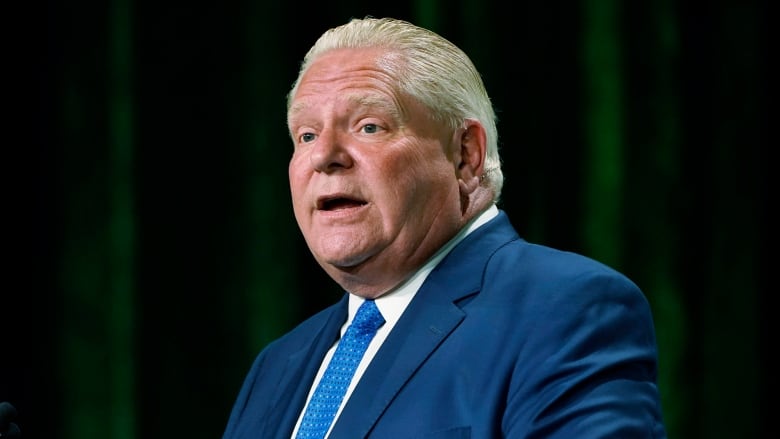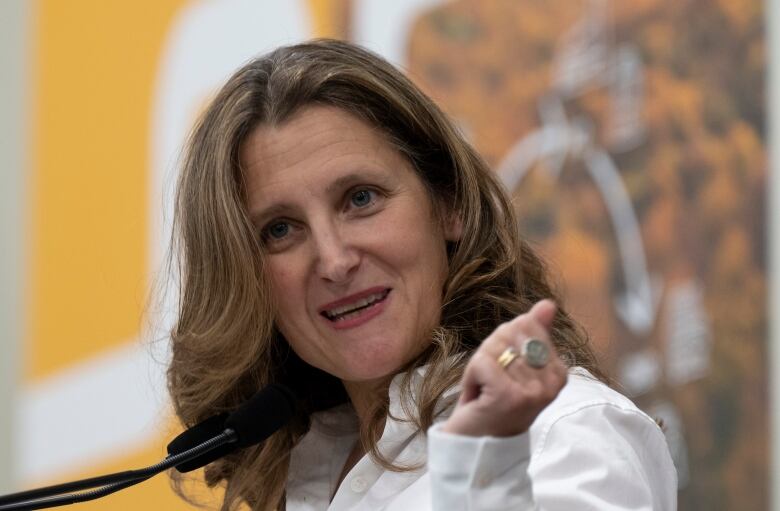Ontario, federal government investing in country's largest battery storage facility in Six Nations
Premier Doug Ford says project will begin operating in 2025

An electricity battery storage facility said to be the largest in Canada is set to open in two years on Indigenous land insouthwestern Ontario, with Six Nations of the Grand River and Ottawa as investors.
The province said Friday it has directed the Independent Electricity System Operator to enter into a 20-year deal with theOneida Energy storage project as part of its push for more clean energy supply.
"Today's announcement is one way in which we are doing our part to create a sustainable future, reducing emissions, as well as providing reliable source of green energy for the benefit of all of our families," said Six Nations Chief Mark B. Hill at a news conference in Ohsweken, Ont.
The project, which has been in development for years and is currently under construction, is set to begin operating in 2025 and will more than double the amount of the province's clean energy storage.
The project will draw and store electricity off peak when power demand is low and return it when demand increases.
Six Nations of the Grand River Development Corporation is an investor in the project, said Matt Jamieson, its chief executive officer.
"There's going to be an economic return and those economic returns will go a long way to help plug things that are important to our community," Jamieson said.
"Like right now, we are facing a $1.6-billion infrastructure gap in our community. We can't wait for funding from federal transfer payments, and we need to take control of our destiny and this is one example of how we can do that."
He saidconstruction of the project has put $50 million into the community and the workforce building it is 97 per cent Indigenous.
NRStore, Northland Power, Aecon and Tesla are partners in the venture, along with the federal government.

Deputy Prime Minister Chrystia Freeland said Ottawa is investing $50 million more in addition to the $170 million in funding from the Canada Infrastructure Bank to build the "largest battery storage project in Canada and one of the largest in the whole world."
"This project is going to help create great jobs for people in Ontario," Freeland said.
"It will store and supply the clean electricity that our province needs, and it will help create economic opportunities forIndigenous communities like Six Nations."
Ontario Premier Doug Ford said the project will store up to 250 megawatts of electricity.
"It will more than double our province's energy storage resources, and will provide enough electricity to power a cityapproximately the size of Oshawa," he said.
The city east of Toronto has a population of 175,000.
The province is facing an energy crunch with demand quickly rising due to the proliferation of electric vehicles and increased manufacturer's needs.
Colin Martin,co-chair of Haudenosaunee external relations committee and police liaison for the Haudenosaunee Confederacy Chiefs Council (HCCC), said HCCC was not consulted about theproject and only learned about the announcement early Friday morning, right before the news conference began.
He arrived at the Gathering Place in Six Nations where the announcement was taking place and was turned away.
"Band council has decided to move ahead and have discussions about something that they don't have the sanctions, the authority or permission from Confederacy Council to be talking about," said Martin.
"We were here to voice or opinions and our thoughts on that and unfortunately, they locked the doors on us."
Their biggest concerns are the environment implications of the project on theterritory and protection oftreaty rights.
With files from Candace Maracle












_(720p).jpg)


 OFFICIAL HD MUSIC VIDEO.jpg)
.jpg)



























































































